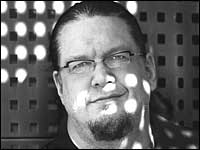Tuesday, May 22, 2007
Willful Ignorance?
Recently, I was at someone's apartment and the conversation turned to Sam Harris, the noted atheist author who had written Letter to A Christian Nation, which addresses, among other things, the dangers of mixing religion and politics. The host owned a copy of one of Harris's earlier books, The End of Faith, which also argues in favor of reason over belief. As the book was taken off the shelf and handed to a guest, someone else present said (in effect) "You probably shouldn't read the book. It makes some good arguments - not as good as the author thinks they are, but still pretty persuasive." Silently, I was taken aback. Clearly there was a lot of cognitive dissonance in the room. The speaker obviously had a great deal of questions about his faith, or at least, enough to read a book that completely demolishes what he has been taught to believe. His response after reading the book, for which, he admits, he has no satisfactory arguments in defense of his faith, was not to revise his beliefs but to advise others not to read the book in the first place. To me, this borders on an attempt to help others remain willfully ignorant. In contrast, if someone handed me a book and was able to persuade me that there was a strong likelihood that that, after reading it, I would be convinced that God exists, or that Unicorns control the UN, et cetera, I would be edger to read it because I'm really interested in finding the truth (or at least, I hope I am). However, it is human nature in many instances to prefer confirmation of one's beliefs, even when mistaken, above being faced with facts that may lead to having to change one's opinion. This is especially true when the person has made a large investment in a particular course of action, and a lifetime of religious belief and practice certainly qualifies. Nevertheless, I'm still encouraged by the fact that there are religious young people who possess the open mindedness to question what they have been taught, even if they are not quite ready to take the next step in the process of moving beyond faith.
Subscribe to:
Posts (Atom)
